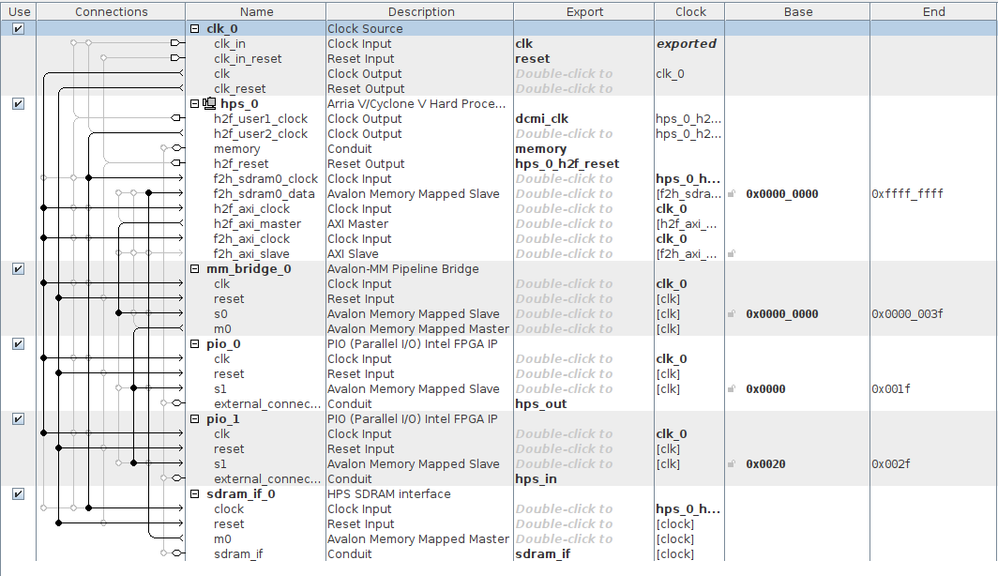- Mark as New
- Bookmark
- Subscribe
- Mute
- Subscribe to RSS Feed
- Permalink
- Report Inappropriate Content
Hello, I am currently trying to get FPGA-SDRAM bridge working.
I have my own QSYS component containing Avalon MM Master which looks like this:
module sdram_if # (
parameter ADDR_SIZE = 32,
parameter DATA_SIZE = 256 )
( clk, reset,
avm_m0_read, avm_m0_write, avm_m0_writedata, avm_m0_address, avm_m0_readdata, avm_m0_readdatavalid, avm_m0_response, avm_m0_writeresponsevalid, avm_m0_byteenable, avm_m0_waitrequest, avm_m0_burstcount,
address, byteenable, read, data_out, write, data_in, busy );
// clk and reset are always required.
input logic clk;
input logic reset;
// Avalon Master ports
output logic avm_m0_read;
output logic avm_m0_write;
output logic [DATA_SIZE-1:0] avm_m0_writedata;
output logic [ADDR_SIZE-1:0] avm_m0_address;
input logic [DATA_SIZE-1:0] avm_m0_readdata;
input logic avm_m0_readdatavalid;
input logic [1:0] avm_m0_response;
input logic avm_m0_writeresponsevalid;
output logic [(DATA_SIZE/8)-1:0]avm_m0_byteenable;
input logic avm_m0_waitrequest;
output logic [10:0] avm_m0_burstcount;
// External conduit
input logic [ADDR_SIZE-1:0] address;
input logic [(DATA_SIZE/8)-1:0] byteenable;
input logic read;
output logic [DATA_SIZE-1:0] data_out;
input logic write;
input logic [DATA_SIZE-1:0] data_in;
output logic busy;
localparam INIT = 3'd0;
localparam READ_START = 3'd1;
localparam READ_END = 3'd2;
localparam WRITE_START = 3'd3;
localparam WRITE_END = 3'd4;
logic [2:0] cur_state;
logic [2:0] next_state;
logic [ADDR_SIZE-1:0] addr;
logic [DATA_SIZE-1:0] data;
logic [(DATA_SIZE/8)-1:0] enable;
// Handling change of the current state to the next requested state
always_ff @(posedge clk) begin
if (reset) begin
cur_state <= INIT;
end else begin
cur_state <= next_state;
if (read) begin
addr <= address;
enable <= byteenable;
end else begin
if (write) begin
addr <= address;
enable <= byteenable;
data <= data_in;
end
end
end
end
// Handling FSM transitions
always_comb begin
next_state = cur_state;
busy <= '0;
case(cur_state)
INIT: begin
if (read) begin
next_state = READ_START;
end else begin
if (write) begin
next_state = WRITE_START;
end
end
end
READ_START: begin
busy <= '1;
if (avm_m0_waitrequest) next_state = READ_START; // Wait here.
else next_state = READ_END;
end
READ_END: begin
busy <= '1;
if (!avm_m0_readdatavalid) next_state = READ_END; // Wait here.
else next_state = INIT;
end
WRITE_START: begin
busy <= '1;
if (avm_m0_waitrequest) next_state = WRITE_START; // Wait here.
else next_state = WRITE_END;
end
WRITE_END: begin
busy <= '1;
next_state = INIT;
end
default: begin
next_state = INIT;
end
endcase
end
// Handling read and write start of each transaction
always_comb begin
avm_m0_address = '0;
avm_m0_read = '0;
avm_m0_write = '0;
avm_m0_byteenable = '0;
avm_m0_burstcount = '0;
avm_m0_writedata = '0;
case(cur_state)
READ_START: begin
avm_m0_address <= addr;
avm_m0_read = '1;
avm_m0_byteenable <= enable;
avm_m0_burstcount = '1;
end
WRITE_START: begin
avm_m0_address <= addr;
avm_m0_write = '1;
avm_m0_writedata <= data;
avm_m0_byteenable <= enable;
avm_m0_burstcount = '1;
end
default: begin
end
endcase
end
// Handling read and write end of each transaction
always_ff @(posedge clk) begin
if (reset) begin
data_out <= '0;
end else begin
case (cur_state)
READ_END: begin
if (avm_m0_readdatavalid) begin
data_out <= avm_m0_readdata;
end
end
default: begin
end
endcase
end
end
endmodule
It's wired in the Platform Designer like this:
I also have VHDL entity for testing, the process accessing the SDRAM looks like this:
count : PROCESS (nrst, clock) IS
VARIABLE counter : INTEGER := 0;
VARIABLE ticks : INTEGER := 0;
VARIABLE write_en : STD_LOGIC := '0';
CONSTANT START_ADDR : STD_LOGIC_VECTOR(31 DOWNTO 0) := STD_LOGIC_VECTOR(to_unsigned(16#2000_0000#, 32));
CONSTANT BYTE_ENABLE : STD_LOGIC_VECTOR(31 DOWNTO 0) := (OTHERS => '1');
BEGIN
IF nrst = '0' OR h2f_nrst = '0' THEN
sdram_data_write <= (OTHERS => '0');
sdram_address <= (OTHERS => '0');
sdram_byteenable <= (OTHERS => '0');
sdram_read <= '0';
sdram_write <= '0';
i_led <= (OTHERS => '0');
counter := 0;
ticks := 0;
write_en := '0';
ELSE
IF rising_edge(clock) THEN
sdram_read <= '0';
sdram_write <= '0';
sdram_data_write <= (OTHERS => '0');
sdram_address <= (OTHERS => '0');
sdram_byteenable <= (OTHERS => '0');
IF counter = 50_000_000 THEN -- every 1 sec
counter := 0;
IF write_en = '0' AND ticks = 30 THEN -- delay writing by 30 sec
write_en := '1';
i_led(7) <= '1';
ticks := 0;
END IF;
IF write_en = '1' THEN
sdram_address <= START_ADDR;
sdram_data_write(31 DOWNTO 0) <= STD_LOGIC_VECTOR(to_unsigned(ticks, 32));
sdram_byteenable <= BYTE_ENABLE;
sdram_write <= '1';
END IF;
ticks := ticks + 1;
i_led(0) <= NOT i_led(0);
ELSE
counter := counter + 1;
END IF;
END IF;
END IF;
END PROCESS;
I am checking the SDRAM content from HPS using memtool. The problem is the address keeps incrementing by 16B (256 bits, data width) even when it should remain fixed to 0x2000_0000. Sometimes there is a delay before first write transaction occurs for some reason, also sometimes write transactions stop happening or the address goes back to the start.
Example memory content looks like this (I also highlighted an adress when I released the reset button - the counter did reset but the address did not):
What am I doing wrong? Why the address keeps incrementing and how to fix it?
Thank you for any suggestions!
Link Copied
- Subscribe to RSS Feed
- Mark Topic as New
- Mark Topic as Read
- Float this Topic for Current User
- Bookmark
- Subscribe
- Printer Friendly Page

